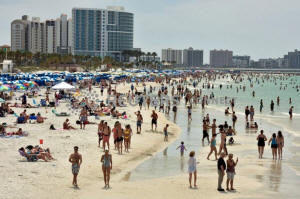No coronavirus party: U.S. spring break destinations crack down on
revelers
 Send a link to a friend
Send a link to a friend
 [March 18, 2020]
By Zachary Fagenson and Brad Brooks [March 18, 2020]
By Zachary Fagenson and Brad Brooks
MIAMI BEACH (Reuters) - In Florida,
sun-soaked Miami Beach shut down its spring break party this week,
declaring it illegal for more than 10 people to gather together and
shutting its bars and restaurants in an effort to stymie the spread of
the coronavirus.
The move there and in nearby Fort Lauderdale was the latest sign of U.S.
cities struggling to cope with a pandemic sweeping across the nation.
"It's so weird, we didn't think it was going to get this bad," said Jay
Jones, a 22-year-old student from Drexel University in Philadelphia who
was walking around Miami Beach. "At least I'm still in warm weather
though, so whatever, I'll just hang out in the hotel and flex. I'm
staying for the rest of my trip."
Miami Beach and Fort Lauderdale set up barricades blocking access to
public beaches. Police cars were stationed behind the dunes and police
officers on ATVs and bicycles were out in force to monitor traffic and
crowds.

The mayors of Miami Beach and Fort Lauderdale said they would issue
fines for anyone breaking the restrictions and did not rule out the
possibility of arrests.
"Closing our public beaches was without precedent, but necessary," Fort
Lauderdale Mayor Dean Trantalis said.
Illustrating the threat to the community, he announced that three
elderly people at nursing homes had died, with one death confirmed to be
coronavirus and two others suspected.
The decision was particularly painful for small businesses that rely on
spring break tourists for a windfall.
[to top of second column]
|

People crowd the beach, while other jurisdictions had already closed
theirs in efforts to combat the spread of novel coronavirus disease
(COVID-19) in Clearwater, Florida, U.S. March 17, 2020.
REUTERS/Steve Nesius/File Photo

Restaurants in South Beach were open and somewhat busy earlier
Tuesday, ahead of orders to close by 11 p.m. Patios were packed with
diners and college students chased away hangovers with cups of
coffee while coming to the realization that the vacation they
planned is over.
In Fort Lauderdale restaurants, bars and other businesses closed at
5 p.m.
Over at South Padre Island in Texas – a sliver of land connected to
the continent by a 2-mile-long bridge and where upward of 50,000
students descend on a town of less than 3,000 residents each year –
restrictions were looser.
The beaches were not closed and students did not have much to fear
from flaunting any rules.
"Are we lining people up and pushing them off the beach? No," said
Nikki Soto, a city spokeswoman. "We're recommending they not start a
beach party, but nobody will be ticketed. There is no quarantine, no
lockdown here. But it's been a very slow spring break."
(Reporting by Zachary Fagenson in Miami Beach and Brad Brooks in
Austin, Texas; Editing by Scott Malone)
[© 2020 Thomson Reuters. All rights
reserved.] Copyright 2020 Reuters. All rights reserved. This material may not be published,
broadcast, rewritten or redistributed.
Thompson Reuters is solely responsible for this content.
 |